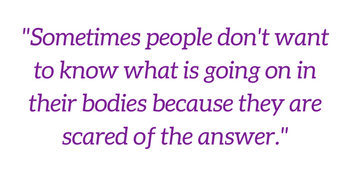Decoding the Body’s Secrets
Posted on
One Woman’s Journey to Determine Hereditary Cancer Risks Reveals Volumes
Three-time cancer survivor Shalanda Little is a fighter, a strong-willed woman, a loving daughter, and a friend to many. But above all, the 42-year-old New Britain resident is a proud, loving mother. Tahara is my pride and joy,” she said of her 24-year-old daughter. “I pray that she will never have to endure what I did.”
Shalanda’s fight against cancer began 17 years ago when she was diagnosed with Hodgkin’s lymphoma. The diagnosis was a devastating blow to the young mother, whose radiation and chemotherapy treatments left her with little energy to play with, let alone care for, young Tahara.
Remission brought relief and elation, a state that lasted more than a decade before the Hodgkin’s lymphoma returned. Shalanda mustered the strength and courage to once again face her adversary and was declared cancer-free after two additional years of chemotherapy.
Everything seemed to be okay… until she found a lump last year. The New Britain resident returned to The Harold Leever Regional Cancer Center where her oncologist of 17 years, Dr. Kert Sabbath, confirmed her fears: the lump was cancerous. “All I could think was, ‘How could this be? I am too young!’”
Shalanda’s surgeon and medical oncologist suggested that an inherited genetic mutation could have contributed to her most recent diagnosis. The two explained that a few simple tests would not only reveal whether or not she carried the BRCA mutation, but could also determine her future risk of developing other forms of cancer. “At that point,” Shalanda said, “I knew we needed answers for both me and my daughter.”
The physicians referred their patient to Joanne Giedra, HLRCC Cancer Program Navigator, who explained that Shalanda would first undergo genetic counseling – a noninvasive series of assessments that would determine if additional genetic testing was necessary. Within days, Shalanda had an appointment for a phone interview with a board-certified genetic counselor.
Shalanda recalled the nearly hour-and-a-half phone call during which the counselor explained the process and asked in-depth questions about her life and family. “We talked about where I was born, the places I lived, my genealogy, my siblings, and any family health problems. Because I am adopted, I wasn’t sure about some answers, but my counselor said it was okay to only answer as much as I knew. After the call, she referred me to an online assessment that asked many similar questions.”
After a thorough analysis of her answers, the counselor reported that Shalanda was a good candidate for genetic blood testing. Shalanda returned to the Leever Cancer Center where a small sample of blood was collected and sent to the testing laboratory. After three anxious weeks, the call she was waiting for finally came. “It was a relief!” she exclaimed. “Out of the 30 genes they tested, 26 of them came back negative for a higher cancer risk. The remaining four genes tested ‘inconclusive,’ which meant it was impossible to determine the risk. They also were able to tell that my lineage originated all the way back into specific regions of Africa and Egypt!”
But the best news of all, she said, came from the two little words that summed up her risk of passing a breast cancer gene to her daughter. “BRCA-negative!” she exclaimed, laughing. “I got down on my knees and thanked God.”
Six months later, Shalanda is thrilled to announce that she is cancer-free, back to work, and enjoying every minute she can with her beloved daughter. She’s also found a new purpose in life, she said: spreading the news about cancer prevention and screening among Connecticut’s African-American community. “African-American women are the most likely to die from breast cancer in our state,” she stated. “I think there’s a lot of fear out there. Sometimes people don’t want to know what is going on in their bodies because they are scared of the answer."
“But I think that’s why God put me through this,” she said, “so that I can share my story and urge women to self-check or encourage anyone who feels that something is wrong to see their doctor right away.” “Because knowledge,” she said, “is power.”
